In a rapidly evolving marketplace, customer service is no longer just about solving problems—it’s about creating lasting relationships. As consumer expectations rise, businesses must adopt a holistic approach to customer service, especially as we look to 2025 and beyond.
A solid customer service philosophy is essential for any organization seeking to thrive in this digital age. It acts as a guiding principle that shapes interactions and defines the company’s approach to customer satisfaction, aligning closely with core values, mission, and vision.
This comprehensive guide will explore how to develop a powerful customer service philosophy tailored for the future. We’ll dive into practical steps for understanding customer needs, analyzing behavior, and fostering collaboration, while highlighting the benefits of using tools like LiveAgent to enhance your customer service efforts.
Table of Contents
What is a good customer service philosophy?
A good customer service philosophy puts the customer at the center of every decision, interaction, and strategy. It values empathy by understanding and caring about customers’ needs and feelings. Consistency is crucial, ensuring every customer gets the same positive experience across all touchpoints.
Here are the core elements of a strong customer service philosophy:
- Empathy: Understand and genuinely care about customers’ needs and concerns.
- Consistency: Offer a uniform experience at all interaction points.
- Proactivity: Anticipate needs and prevent issues before they arise.
- Clarity: Communicate clearly to keep customers informed and valued.
| Element | Description |
|---|---|
| Empathy | Care about customer needs and feelings |
| Consistency | Ensure uniform experiences |
| Proactivity | Prevent potential issues |
| Clarity | Provide clear communication |
A strong customer service philosophy is vital for creating customer loyalty and enhancing customer satisfaction. By implementing these principles, businesses can foster positive customer experiences and ensure every customer feels valued.
Importance of a customer service philosophy
A customer service philosophy is crucial for aligning a company’s values with its customer interactions. It ensures consistent and positive support experiences, which in turn builds brand loyalty and retention. Given that 50% of customers might leave after one bad interaction, providing exceptional customer service is vital.
A strong customer service philosophy sets a business apart by fortifying customer trust. It empowers staff to make decisions that reflect the company’s core values, boosting employee engagement and positively affecting sales. Below are key aspects of an effective philosophy:
- Consistency: Align practices with company values for unified service.
- Empowerment: Enable staff to make customer-focused decisions.
- Adaption: Remain flexible to handle changing circumstances.
Such a philosophy lays a firm groundwork for coping with future challenges while ensuring superior customer experiences. For companies seeking the best tools to support this, LiveAgent stands out, providing powerful features that facilitate excellent customer interactions and feedback management.
Aligning the philosophy with core values, mission, and vision
This philosophy should act as a set of guiding principles for every customer interaction, ensuring a consistent and positive experience.
Start by defining a clear vision statement for customer service. This helps employees understand the type of service expected. Ensure it reflects the company’s mission and values so that everyone from the customer service representatives to the customer support team operates under a unified approach.
A well-structured philosophy fosters a culture where every team member embodies these principles daily. As your company grows, your customer service philosophy should evolve too, adapting to external events to stay relevant and empathetic to customer needs.
Key Elements to Align:
- Core values: Ensure they are central to customer service strategies.
- Mission statement: Reflect this in customer interaction approaches.
- Vision: Guide customer service goals and objectives.
How to create the best customer service philosophy
Creating a dynamic customer service philosophy requires more than just setting principles. It involves aligning these principles with your company’s values and integrating customer needs. By developing a strong framework, your team can deliver exceptional service that aligns with your organization’s goals. A great customer service philosophy also empowers employees and fosters customer loyalty.
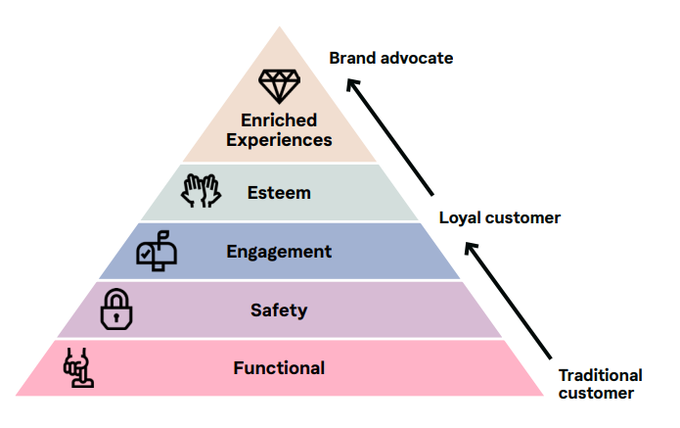
Understanding customer needs
Start by gathering customer feedback to better understand their needs. Use methods like focus groups, satisfaction surveys, live chats, and customer comment cards. This feedback ensures your philosophy aligns with real customer desires.
A customer-centric approach should guide your responses, aiming to exceed expectations and form lasting relationships. Regularly assess and refine the philosophy to adapt to changing customer expectations.
To enhance satisfaction, consider proactive support, such as updates or check-ins before problems occur. Training programs should focus on empathy and active listening to improve communication.
Setting SMART objectives for customer service
Setting SMART objectives—Specific, Measurable, Achievable, Relevant, and Time-bound—helps define clear goals for your service. These might include boosting satisfaction scores or enhancing brand loyalty. Identify key customer touchpoints to tailor your strategies where interaction occurs most. Equip your team with training and tools for effective plan execution. Engaging customers and gathering their insights throughout their journey will inform and refine objectives. Align these objectives with organizational goals to guide interactions meaningfully.
Fostering cross-functional collaboration
A customer service philosophy thrives on teamwork and collaboration. It requires seamless cooperation between departments to deliver great service. Define how team values translate into daily operations, and establish guiding principles that promote engagement. Encourage discussions and feedback from employees to incorporate diverse views when shaping the philosophy.
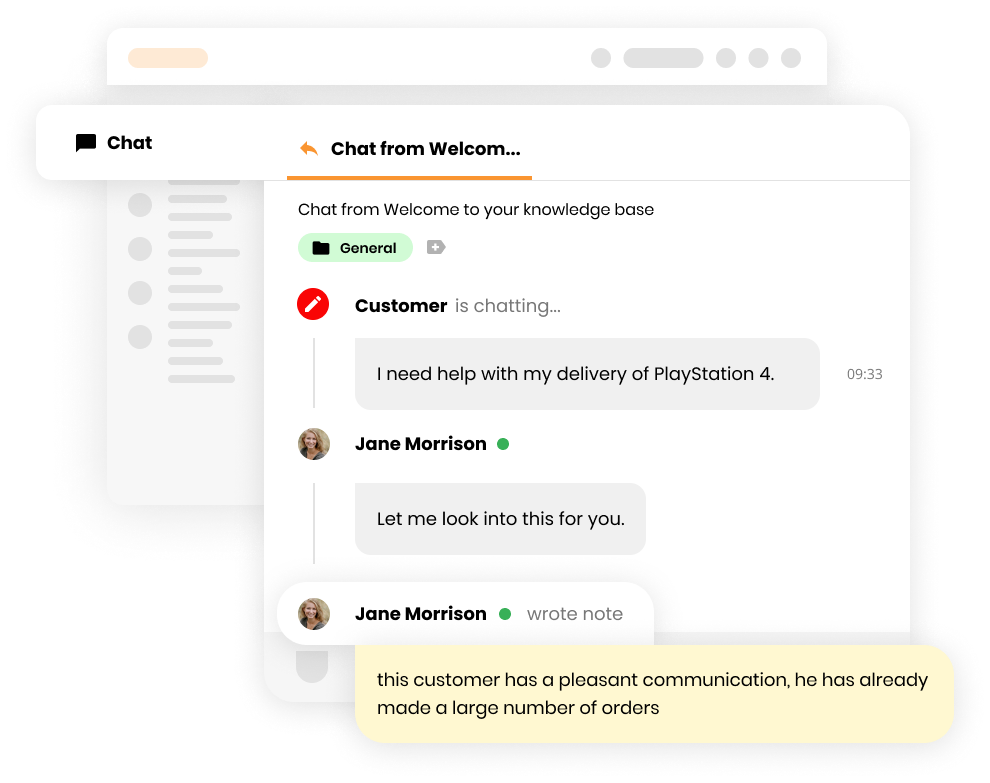
Leaders should model collaboration to ensure their teams align with these principles. Recognize and reward those who display collaboration to foster a teamwork culture, leading to enhanced service delivery.
Empowering employees to embody service standards
Empowerment in customer service means giving teams the training and autonomy to make customer-beneficial decisions. A successful service philosophy depends on employees genuinely understanding and embodying company values.
Training and coaching align employees with these values, improving communication and service delivery. Recognize and reward employees who demonstrate these standards, building a culture of accountability. Leaders play a vital role by modeling values, as employees are more likely to follow suit when seen at the top.
Continuous evaluation and adaptation
Feedback and flexibility are key for evolving customer service. Evaluate and improve your service philosophy regularly to keep up with market changes and customer expectations. Use tools like surveys and feedback forms to gather insights for refinement. A stagnant philosophy might not meet evolving needs, making ongoing evaluation crucial. Organizations that consistently update their philosophy maintain a competitive edge and improve customer experiences.
Crafting an effective customer service philosophy involves understanding customer needs, setting SMART objectives, fostering collaboration, empowering employees, and continuous evaluation.
In this journey, utilizing tools like LiveAgent can significantly enhance your customer service efforts, providing a platform for seamless interactions and consistent experiences. Such tools foster strong relationships and build loyalty by aligning service delivery with your company values.
Gathering customer feedback
Creating an effective feedback system is key to perfecting your customer service strategy. Regularly gather and analyze feedback to uncover areas for improvement. Use methods like focus groups, satisfaction surveys, and live chats to understand customer needs better.
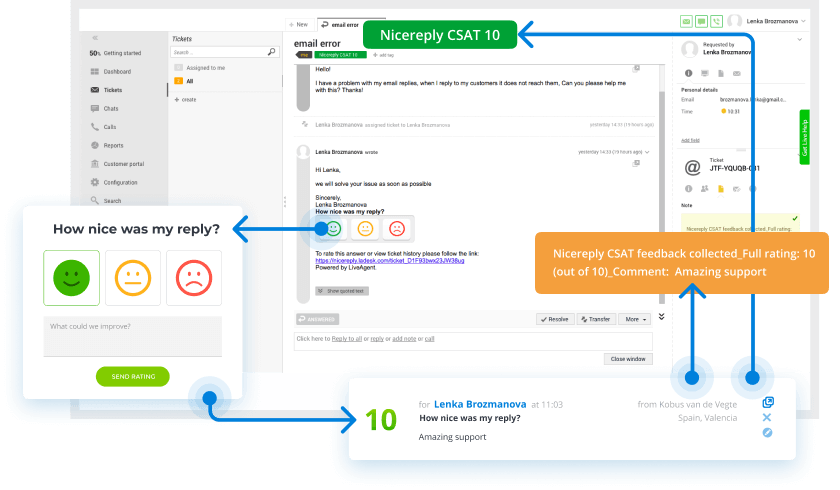
Positive feedback can signal a successful implementation of your philosophy. Furthermore, employee involvement in this process ensures diverse perspectives are considered, making your customer service philosophy more comprehensive. This ongoing cycle of feedback collection and analysis fuels continuous improvement, enhancing overall service quality and leading to innovations that benefit the customer.
Analyzing customer behavior and preferences
Understanding your target audience is crucial in shaping an effective customer service philosophy. Researching customer demographics, preferences, and pain points provides valuable insights into what they desire from service interactions.
Collect feedback through surveys, interviews, and satisfaction forms to understand customer needs better. Analyze customer behaviors and retention rates to measure the success of your customer service approach. Determining whether your strategy is issue-centric or customer-centric can help tailor responses more effectively, improving overall satisfaction.
Regularly review relevant customer service metrics like Customer Satisfaction (CSAT) and Net Promoter Score (NPS). This analysis helps assess how well customer behaviors align with your service offerings and philosophy, ensuring that you maintain strong customer relationships.
When building a robust customer service philosophy, incorporating tools like LiveAgent can be invaluable. This platform allows for seamless interactions and consistent customer experiences, reinforcing your commitment to understanding and addressing customer needs effectively. By aligning service delivery with your company values, you build trust and foster loyalty, positioning yourself for continued success.
Specific goals
Setting specific goals is vital for any customer service strategy. Tailor these goals to your company’s unique needs and customer expectations. For instance, high customer satisfaction is a key goal since satisfied customers are likely to be loyal and recommend your brand.
Other important goals include improving response and resolution times and enhancing customer retention. By focusing on these areas, your customer service team can create exceptional customer experiences that foster loyalty and advocacy.
Measurable metrics
To measure the success of your customer service philosophy, focus on qualitative insights instead of just numbers. Look for metrics that reflect how customers feel about interactions with your brand.
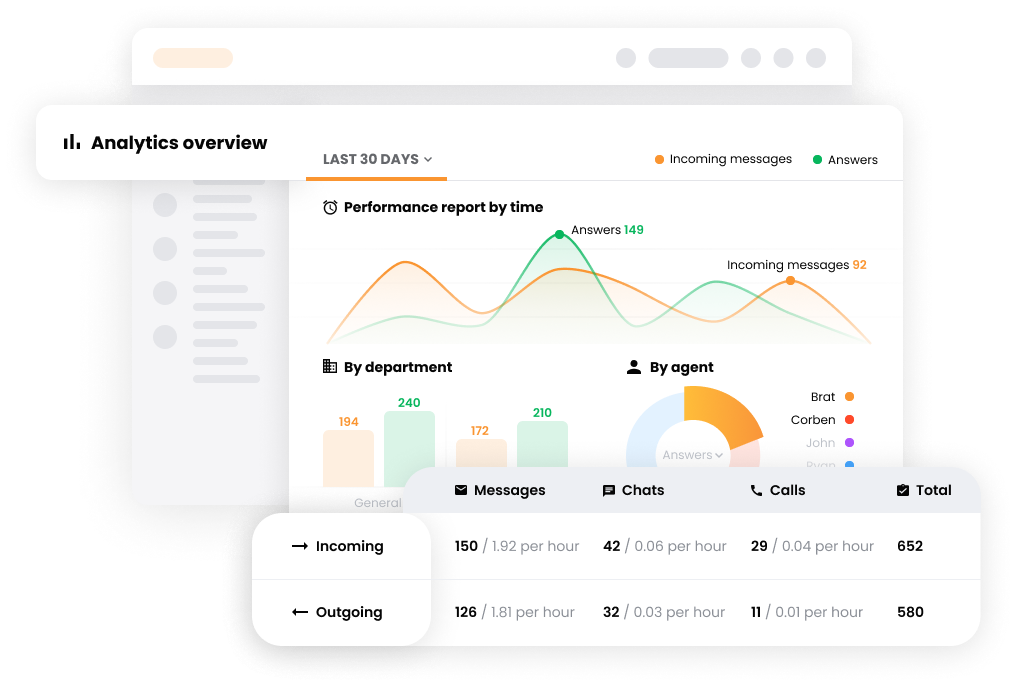
Consider customer feedback and satisfaction scores to gauge success. While response times matter, they should align with your philosophy and core values. Establishing the right metrics ensures your team focuses on delivering a positive customer experience rather than chasing meaningless numbers.
Achievable targets
Make sure your targets are achievable. SMART targets help your customer support team stay focused and practical. Review and adjust these targets regularly to stay aligned with your evolving customer service philosophy. Invest in training to empower your team to meet these objectives.
By doing this, a consistent and positive customer experience is more likely to happen, leading to increased loyalty. Metrics and key performance indicators (KPIs) will help measure success.
Relevant focus areas
A strong customer service philosophy empowers your team and fosters a customer-first strategy. Involve diverse perspectives when crafting this philosophy, ensuring it meets a range of customer needs. Clear guidelines help employees provide consistent, high-quality support. Emphasizing elements like excellence, empathy, and responsiveness helps surpass customer expectations. This approach can greatly enhance customer loyalty and create memorable experiences for all.
Enhance Your Customer Philosophy
Transform your customer service philosophy into measurable success with LiveAgent. Deliver exceptional support effortlessly!
Time-bound milestones
Setting time-bound milestones helps your customer service team stay focused on satisfaction. A well-crafted customer service philosophy brings teams together around shared goals. Gather insights from team members who interact with customers to gain a deeper understanding of their needs.
Clear guidelines and integration of company values spotlight your brand’s commitment to genuine interactions. Regularly update practices to meet evolving expectations and foster innovation. This ensures continuous improvement in service quality.
By thoughtfully setting SMART objectives and leveraging tools like LiveAgent, you can craft an effective customer service philosophy that not only meets but exceeds evolving customer expectations.
Encouraging teamwork across departments
Teamwork is vital for a productive work environment. It emphasizes communication and cooperation among team members toward common goals. Showing that “Teamwork” is more than a motto but a standard of quality is essential for maintaining a service-oriented organization.
Supporting both individual and collective efforts helps the company meet its goals while upholding professional standards of excellence. Collaboration across departments allows for seamless sharing of knowledge and resources, leading to enhanced customer service delivery. This effective teamwork fosters a strong sense of accountability and pride among staff, resulting in improved employee investment in the organization’s philosophy.
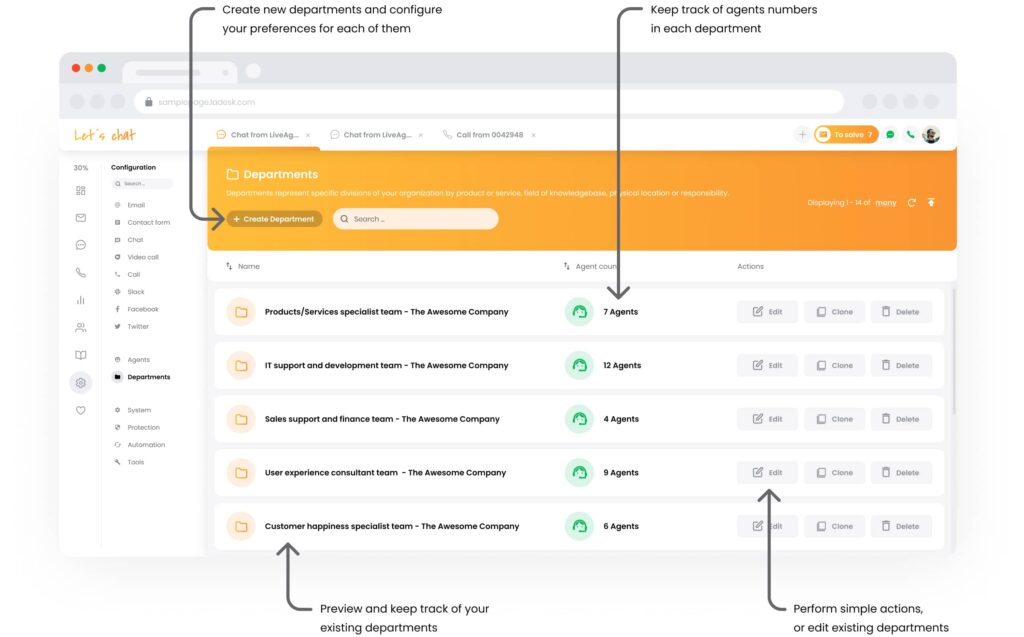
Establishing clear communication channels
Today’s customers expect brands to engage with them through various communication channels, such as social media and messaging apps. Effective communication in customer service involves actively listening to customers, asking questions, and providing accurate information. This approach enhances customer satisfaction.
Implementing a unified contact center can streamline responses for agents managing cross-channel customers. This enables them to quickly provide contextual support. Consistency in communication ensures that customers receive the same level of service regardless of the channel or representative. This builds trust and reliability. Furthermore, transparency about products, services, and processes fosters credibility and trust between support agents and customers.
To further reinforce customer service excellence, tools like LiveAgent can be indispensable. LiveAgent is renowned for supporting comprehensive communication strategies, allowing customer service teams to efficiently handle interactions with customers across multiple platforms. This enhances the overall customer experience and ensures satisfaction.
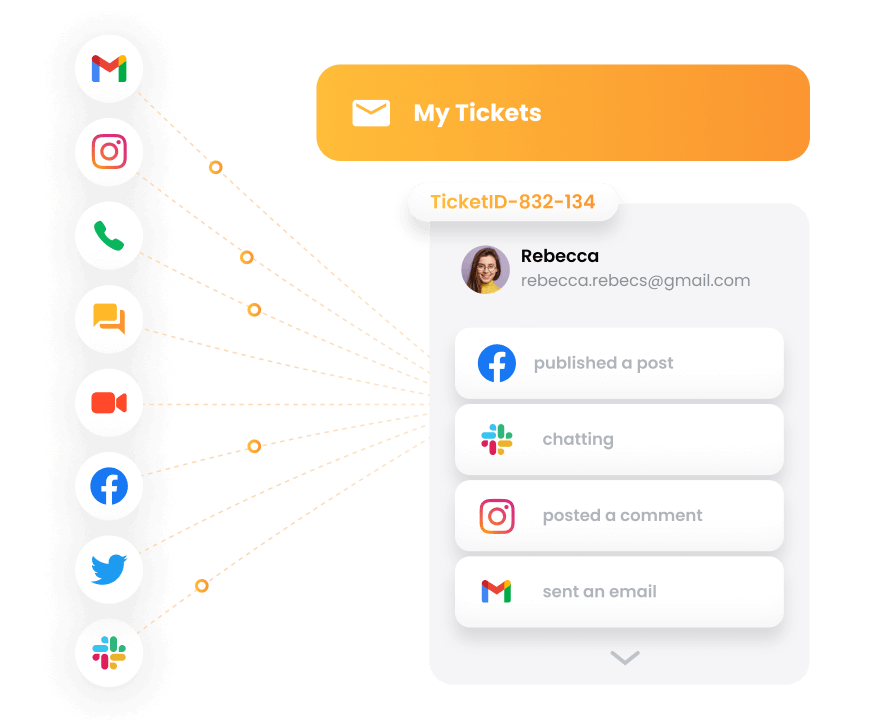
A strong customer service philosophy in 2025 revolves around cross-functional collaboration, teamwork, and clear communication. By integrating these elements, companies can achieve exceptional customer service and foster lasting customer loyalty.
Training and development programs
Investment in training is key to aligning employees with company culture and delivering exceptional service. Training should be an ongoing process, not a one-time initiative. This ensures that your team evolves with the ever-changing customer service landscape and company policies.
It’s important to provide thorough training on the company’s customer service philosophy. Employees should understand the core beliefs and principles behind it. This understanding is critical for effective implementation. Regularly revisiting and adjusting training goals keeps the focus aligned with market dynamics and customer expectations.
Empowered employees, backed by strong training and autonomy, are more likely to offer excellent customer service and create positive customer experiences. This enhances customer loyalty and satisfaction.
Recognizing and rewarding excellent service
Recognition and rewards motivate team members who embody the customer service philosophy. This sets a benchmark for others and promotes a culture of continuous improvement. Celebrating successes related to customer service reinforces the importance of upholding company values.
A strong customer service philosophy promotes ownership among team members. Open channels for sharing experiences and suggestions are vital. Practicing customer service principles in scenarios during training helps internalize these values. For achieving consistent application across interactions, providing teams with relevant resources and tools is essential.
Incorporate LiveAgent as part of your customer service strategy. LiveAgent can streamline communications and response times. It’s an excellent tool for ensuring your customer support team stays connected and efficient. By using the right tools, you empower your team to meet customer needs effectively, fostering exceptional customer experiences.
Monitoring customer feedback regularly
To achieve excellence in customer service, feedback should be gathered and analyzed regularly. Establishing a robust feedback system helps identify areas for improvement. It indicates how well the service philosophy is implemented daily. Encourage customers to share their thoughts through surveys, reviews, and direct interactions. This continuous loop of feedback allows organizations to adjust their customer service strategies based on real-time data.
Consider the following table for tools that aid in feedback monitoring:
| Tool | Purpose |
|---|---|
| Customer surveys | Gather structured feedback |
| Feedback fForms | Provide space for open-ended responses |
| LiveAgent | Centralizes all customer interactions |
Adapting to changing customer expectations
Customer expectations shift rapidly due to technological advances and cultural changes. They now prefer a range of digital communication channels. This demands customer service teams to reconsider how they deliver services. Sustainability is gaining importance among consumers, urging companies to adopt eco-friendly practices. Regularly revisiting your customer service philosophy ensures it stays aligned with customer needs and industry innovations.
Gathering feedback from customers is critical for assessing how well your philosophy aligns with their expectations. Doing so enables continuous improvement and responsiveness to customer needs.
By consistently monitoring feedback and adapting to changes, organizations can nurture exceptional customer experiences. This approach allows them to maintain a competitive edge and promote lasting customer loyalty.
Real-world examples of effective customer service philosophies
Creating a customer service philosophy that resonates with both customers and employees is vital for any business. Companies like The Ritz-Carlton, Disney, Trader Joe’s, Amazon, and Zappos have demonstrated remarkable success with their philosophies. These philosophies guide how they meet customer expectations and deliver exceptional customer service.
Let’s explore what makes these companies stand out.
Lessons from Amazon
Amazon’s customer service philosophy is all about being customer-obsessed. The company puts customer needs first in all interactions. This focus has enabled innovations like one-click shopping and Amazon Prime. By prioritizing customer feedback, Amazon sets high standards in e-commerce service.
Amazon recognizes that satisfaction is not enough. They strive for a full understanding and enhancement of the customer experience. This led to products like Amazon Prime, satisfying modern customers’ need for instant gratification. This customer-first philosophy has driven significant revenue, showcasing the power of aligning company values with customer interactions.
Insights from Zappos
Zappos aims to deliver WOW experiences through exceptional service. Their philosophy empowers representatives to go above and beyond, focusing on customer satisfaction even at a high effort cost. This customer-centric approach makes satisfaction and retention core to Zappos’s success.
Zappos maintains a positive company culture. This culture encourages personalized and memorable service, allowing representatives to make independent decisions that benefit customers and the company. The result? A service-first strategy that has driven over $2 billion in revenue. Zappos proves that empowering employees leads to exceptional service outcomes.
Strategies from Disney
Disney creates magic by focusing on detail and consistently exceeding expectations. Their approach is built on the “Four Keys”: Safety, Courtesy, Show, and Efficiency. These principles drive positive experiences for every guest.
Disney invests in employee training through the Disney Institute, offering courses on customer service practices. They teach employees to express happiness and helpfulness as they interact with guests. This culture of being “on stage” at all times fosters exceptional customer interactions.
Disney also uses the C.A.R.E. framework—Clarify, Align, Reinforce, Empower—to guide leaders. This ensures actions are always aligned with creating customer happiness and satisfaction. Such detailed strategies allow Disney to maintain its magical reputation.
Achieving outstanding customer service starts with a strong philosophy. It gives structure and motivation for all customer interactions. Utilizing tools like LiveAgent can boost your customer service efforts, ensuring seamless support and building loyalty. By learning from industry leaders like Amazon, Zappos, and Disney, businesses can refine their philosophies to meet and exceed customer expectations.
Enhance Your Customer Philosophy
Transform your customer service philosophy into measurable success with LiveAgent. Deliver exceptional support effortlessly!
Conclusion
A well-crafted customer service philosophy is key to creating positive support experiences and fostering customer loyalty. With clear guidelines for employee interactions, companies ensure consistency in how customers are treated. A strong philosophy promotes trust and sets your business apart from competitors, crucial for customer retention. When half of all customers might switch to a competitor after just one negative experience, prioritizing customer satisfaction is imperative.
Tools like LiveAgent can be instrumental in executing an effective customer service philosophy. They streamline support processes, ensuring excellent customer service and quicker response times. Don’t hesitate to try our 30-day free trial today.
Frequently Asked Questions
What are the basics of customer service philosophy?
A customer service philosophy is based on a set of principles that guide how a business interacts with its customers. It involves understanding customer needs, aligning company values with service delivery, and consistently meeting or exceeding customer expectations.
How do you communicate your customer service philosophy to your employees?
Communicate your customer service philosophy to employees through regular training sessions, clear internal communications, and by integrating it into all aspects of your employee onboarding and ongoing development programs. Lead by example to reinforce these values in day-to-day operations.
What resources do you allocate to support your customer service philosophy?
Resources to support a customer service philosophy include investing in customer relationship management (CRM) software, training programs, customer feedback tools, and sufficient staffing to ensure quality service. Budget allocations should also reflect the importance of maintaining high service standards.
What role does transparency play in your customer service philosophy?
Transparency is crucial in building trust and credibility with customers. It involves clear communication about policies, keeping customers informed about the status of their inquiries and openly addressing any issues or mistakes. Transparency in customer interactions helps strengthen relationships and enhance customer loyalty.
Share this article

 Български
Български  Čeština
Čeština  Dansk
Dansk  Deutsch
Deutsch  Eesti
Eesti  Español
Español  Français
Français  Ελληνικα
Ελληνικα  Hrvatski
Hrvatski  Italiano
Italiano  Latviešu
Latviešu  Lietuviškai
Lietuviškai  Magyar
Magyar  Nederlands
Nederlands  Norsk bokmål
Norsk bokmål  Polski
Polski  Română
Română  Русский
Русский  Slovenčina
Slovenčina  Slovenščina
Slovenščina  简体中文
简体中文  Tagalog
Tagalog  Tiếng Việt
Tiếng Việt  العربية
العربية  Português
Português 
